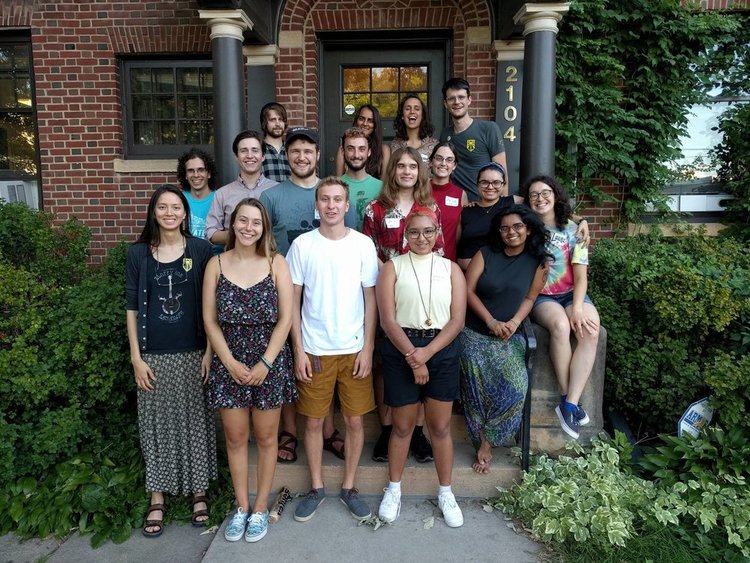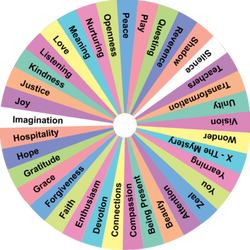Will an Ecological Civilization be Fun?
Ecological Civilization, the Sunrise Movement, and the Green New Deal
Ecocivers and Sunrisers
Principles of the Sunrise Movement
|
|
Living with Zest for Life
You Feel the Greatness of Being Alive"You feel your own life — your heart, your mind, your body, your sexuality, the people and things you are connected to — and you spontaneously fill with the exclamation: "God, it feels great to be alive!" That's delight."
* Ronald Rolheiser in The Holy Longing, cited in Spiritiuality and Practice Zest for Life is the source of our PassionThe zest for life, which is the source of all passion and all insight, even divine, does not come to us from ourselves.... It is God who has to give us the impulse of wanting him.
* Pierre Teilhard de Chardin quoted in Spirit of Fire by Ursula King, cited in Spiritiuality and Practice |
You know life is a GiftLiving well is an art that can be developed: a love of life and ability to take great pleasure from small offerings and assurance that the world owes you nothing and that every gift is exactly that, a gift.
* Maya Angelou in Wouldn't Take Nothing for My Journey Now, cited in Spiritiuality and Practice Your heart is Open, Clear, and StrongMany native cultures believe that the heart is the bridge between Father Sky and Mother Earth. For these traditions, the four-chambered heart, the source for sustaining emotional and spiritual health, is described as being full, open, clear, and strong. These traditions feel that it is important to check the condition of the four-chambered heart daily, asking: "Am I full-hearted, open-hearted, clear-hearted, and strong-hearted?"
* Angeles Arrien in The Four-Fold Way |
Introducing the Idea
of Ecological Civilization
without mentioning fun or delight
unless implied by the word "flourishing"
The Worry |
The Hope The Game Plan |
Will an Ecological Civilization be Fun?
A Concluding Reflection by Jay McDaniel
When I use the phrase ecological civilization with some people, they do not hear their own concerns or interests Some people tell me that it is too abstract and global for them, lacking resonance with the local and particular. "It has nothing to do with family life or care for the local community or interpersonal relations." Others simply say that it makes them think of environmentalism writ-large, but without appeals for social justice. "It's all about taking care of the planet but not about taking care of people. It neglects the displaced, the marginalized, the forsaken."
Beloved Community with Ecology Added
I disagree, but I know that they need alternative language. In some settings I prefer Martin Luther King, Jr.'s phrase "beloved community" to "ecological civilization," because King's phrase has emotional warmth. People ask me what an ecological civilization is, and I say "it's beloved community with ecology added." If they give me a little more time, I add:
"And ecology is more than something 'added.' In an ecological civilization, ecology is the larger web of life -- the hills and rivers, trees and stars -- and this web of life is not simply an issue among issues, but a context for all issues. Imagine beloved community in which the hills and rivers, trees and stars, are our neighbors, along with the poor and powerless. We care for our kindred humans, especially the poor and powerless; and we care for our other neighbors, too, seeking ways that we can all flourish. That's ecological civilization." |
It sounds an awful lot like a combination of Martin Luther King, Jr. and indigenous religious traditions, and it is. It's also a bit like a socially engaged Buddhism or, for that matter, a creation-centered prophetic Judaism, Christianity, or Islam. It's not exactly new, it's just not "modern" in the Western sense that so sharply separates "humanity" from "nature." As they say in China, it is constructively postmodern.
In any case, I'm an evangelist for the phrase ecological civilization, thus understood. But I have to admit that I myself sometimes find that the phrase "ecological civilization" falls flat. I know these civilizations are important and that I ought to be working toward them. But sometimes the descriptions of them focus so much on worldview and public policy that they don't inspire me at some deep level. The same applies when I hear phrases such as "the common good." and "a relational worldview." And when I hear too much talk about "systems" of productiion, consumption, and agriculture as if everything is, or could be, machine-like. I miss something. Other people I admire do as well. We're not just looking for a different kind of world or even a different way of thinking. We're looking for a more alive way of being in the world. We're looking for beloved community that includes a love of life.
A Role for Fun?
I'll put it this way: Will an ecological civilization be fun? Will there be any joy in it? Any spontaneity? Any playfulness? Any zest?
Will it involve more than righteousness?
Don't get me wrong. I'm not against righteousness, and I'm fond of survival, too -- for everybody, including future generations of people and other living beings. I know that ecological civilizations are necessary in light of global climate change and the wide range of calamities that face humanity: environmental destruction, political dysfunction, gaps between rich and poor, violence and war, the spiritual malaise of consumerism. I’ve read Pope Francis’ Laudato Si, and I'm on board. I've also read John Cobb, Andrew Schwartz, Phillip Clayton and others. I’ve been to China as well, and listened to Zhihe Wang and others talk about its special importance for Chinese! I get it. We may be in big trouble if we don't build such civilizations. I myself have published many essays in Open Horizons on the nature and importance of ecological civilizations. See, for example, Andrew Schwartz: The Radical Vision of Ecological Civilization. Or John Cobb's Five Foundations for an Ecological Civilization.
Still I ask, will the civilizations they call for -- we call for -- be fun?
Wisdom and Compassion
Let me get something out of the way right away. I know that these civilizations will combine wisdom and compassion, righteousness and kindness. They will be good.
The citizens of an ecologicacal civilization will live with respect and care for the community of life, knowing that they are small but included in a larger web of life. They will not think in terms of a duality between “humanity” and “nature” but will instead see themselves as inside something more than them that includes the hills and rivers, trees and stars. They will see the world itself, not simply as a collection of objects to be understood or owned, but as a communion of subjects that belong to a single, interconnected whole: a cosmic family of sorts. Some might even believe that this larger whole is itself a self or soul and address it as “God” or “Amma” or “Abba.”
They will have a shared ethic as well. They will care for each other and also care for other creatures and their habitants, living within the limits of the earth to absorb pollution and supply resources. They will reside in green cities and green villages that partner with one another in symbiotic relationships. Their economics will be ecological, measuring economic well-being in terms that take the earth into account. Their agriculture will renew the soil rather than depleting it, and their manufacturing will be local as much as possible. Andrew Schwartz says that this is all possible and I sure hope he's right. Its citizens will have good values, too: justice, kindness, hospitality to others, reverence for life, and a sense of connection. These values will be imparted at home, in society, and in school – not so much by didactic preaching as by the examples of their mentors. The goodness of an ecological ciilization will include education for wisdom and compassion.
Still I ask, again, will their civilization be fun?
Twelve Forms of Fun
You might already be saying "Yes" and quickly add that all of what I said above implies fun. I be you are right. Justice, kindness, hospitality, reverence for life, and a sense of connection are all enjoyable, all fun. Serious thinkers with furrowed brows – if they are philosophers they may be influenced by Immanuel Kant -- may talk as if we ought to hold these values, as if enjoyment is irrelevant. And perhaps we are indeed duty-bound to hold such values. I'm on board here, too. I want people to be kind to others even if they don't feel like it, and I want the same for myself. Still, it can indeed be pleasurable to enjoy just relations with other people and the earth, to revere the whole of life, to extend hospitality to strangers. In the language of Alfred North Whitehead in Process and Reality, it can be satisfying to be good.
In any case by “fun” I mean a little more than ethically noble traits just mentioned. I have in mind:
- Being Present in the Present Moment
- Imagination
- Playfulness
- Love (including sexual love)
- Questing
- Enthusiasm
- Wonder
- A Sense of Mystery
- Openness
- Passion for Beauty
- Yearning
- Zest for Life
We might call them forms of aliveness. These forms of alivenesss are beautiful in their own right, and thus have an aesthetic quality. but it demeans them to speak of them as aesthetic values alone. They are part of the spice of life, apart from which life be good but not happy. In Process and Reality Whitehead says that at every moment of our lives we are seeking, not only meaning and not only love, but satisfying forms of subjecive aliveness. These are among the twelve "satisfying forms of aliveness" of which humans can partake.
The Spiritual Alphabet
I borrow the examples above from the "spiritual alphabet" developed by Frederic and Mary Ann Brussat of Spirituality and Practice. If the word "spirituality" is not your word, just think of them as twelve forms of emotional well-being or twelve forms of emotional wisdom. Let "spirituality" and "emotional well-being" be synonymous.
So here is my point. All too often in descriptions of ecological civilizations, in talk about the common good, in discussions of needs for systemic changes, and even in discussions of needs for vision, I miss the twelve forms of spirituality or emotional well-being identified above. I hear vision and ethics, but not spirituality or emotional aliveness.
So what's the Problem?
There are several problems with this. One is that the very idea of "ecological civilization" is not -- dare I say it -- marketable if people do not hear in it a promise of emotional well-being. It will appeal to fear and obligation, but not to the possibility of joy. The second it that the idea, articulated in ways that lack the spiritual or emotional side, is not truly ecological. The ecology of life on our planet is all about, at the very least, sexuality and play and, if Jane Goodall is right, wonder as well. Other animals have needs for these forms of aliveness, and we do, too. The third is that any semblance of ecological civilization that emerges in local settings, in any part of the world, will need to offer powerful tastes of the twelve forms of vitality just named, plus others, or it will not be sustainable. It will not give people the sustenance they need truly to flourish in their ecological civilizations.
Zest as the Encompassing Value
How, then, might we include these twelve under a single rubric that is easy to articulate and communicates our meaning. One possibility is to build upon what the Brussats say about the twelfth trait, which I call zest for life and they call "the practice of zeal." One thing to to be noted is that they link zest with others in the spiritual alphabet, suggesting strong connections between the ethical and the aesthetic, the compassionate and the joyful.
So what's the Problem?
There are several problems with this. One is that the very idea of "ecological civilization" is not -- dare I say it -- marketable if people do not hear in it a promise of emotional well-being. It will appeal to fear and obligation, but not to the possibility of joy. The second it that the idea, articulated in ways that lack the spiritual or emotional side, is not truly ecological. The ecology of life on our planet is all about, at the very least, sexuality and play and, if Jane Goodall is right, wonder as well. Other animals have needs for these forms of aliveness, and we do, too. The third is that any semblance of ecological civilization that emerges in local settings, in any part of the world, will need to offer powerful tastes of the twelve forms of vitality just named, plus others, or it will not be sustainable. It will not give people the sustenance they need truly to flourish in their ecological civilizations.
Zest as the Encompassing Value
How, then, might we include these twelve under a single rubric that is easy to articulate and communicates our meaning. One possibility is to build upon what the Brussats say about the twelfth trait, which I call zest for life and they call "the practice of zeal." One thing to to be noted is that they link zest with others in the spiritual alphabet, suggesting strong connections between the ethical and the aesthetic, the compassionate and the joyful.
The spiritual practice of zeal means being fully aroused by life. We tap into the divine energy that pulsates within us and around us. We are ready for anything that comes our way, and every moment is a golden gateway to new possibilities. |
In the spirit of the Brussats, let zeal or zest for life be the umbrella within which we appreciate the twelve forms of fun. My simple suggestion, then, is that, in imagining the future we rightly hope for -- an ecological civilization -- we rightly make space for zest.
Fear is not enough. Those of us who advocate ecological civilizations will not succeed in persuading large numbers of people to be committed to the ideal unless we include, within our descriptions of such civilizations, a joy factor. Ecological civilizations need to include merrymaking, pleasure, sexuality, imagination, and playfulness, wonder, and a sense of mystery. Its spirituality is rooted in a faith in life, itself "a golden gateway to new possibilities."
Fear is not enough. Those of us who advocate ecological civilizations will not succeed in persuading large numbers of people to be committed to the ideal unless we include, within our descriptions of such civilizations, a joy factor. Ecological civilizations need to include merrymaking, pleasure, sexuality, imagination, and playfulness, wonder, and a sense of mystery. Its spirituality is rooted in a faith in life, itself "a golden gateway to new possibilities."












